Housing at the University of Washington
Housing at the University of Washington is administered by the Housing & Food Services (HFS) department at the University of Washington. Undergraduates are housed primarily in residence halls located on North Campus and West Campus. There are also 12-month apartment spaces available for undergraduate students. Graduate and professional students are provided the option to live in 12-month apartments operated either by the university or privately. The University of Washington does not require students to live on campus. Housing is not guaranteed but placement in the residence halls is guaranteed for returning residents. Most winter quarter and spring quarter applicants are assigned housing.[1] There are also three family housing options for registered full-time students at the Seattle campus.
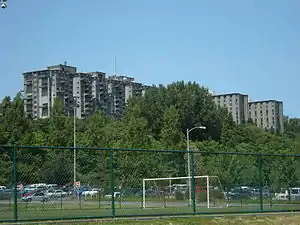
Fraternities and sororities at the University of Washington accommodate from 15 to 116 members. More than 1,000 freshmen a year live in the university's 50 fraternity and sorority houses.[2]
Residence halls
North Campus
North Campus includes the residence halls Hagget Hall, Hansee Hall, Madrona Hall, McCarty Hall, McMahon Hall, and Willow Hall.[3] Oak Hall, the fourth and final residence hall to be built as a part of the University's Housing Master Plan, is scheduled to be completed in 2020.[4]
Haggett Hall
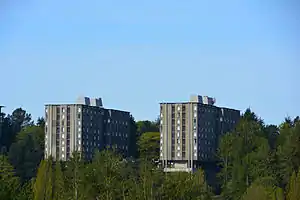
Haggett Hall is a set of two towers located in the northeast section of the University of Washington campus.[5] The set of buildings was named for Arthur Haggett (once Dean of the College of Liberal Arts), and his wife Winnifred Sunderlin Haggett (once the Dean of Women). The architects of Haggett Hall were Kirk, Wallace, McKinley and Associates.[6][7]
Haggett Hall serves as one of the residence halls on the University of Washington campus. Each building contains a lobby and eight additional floors. Each floor contains approximately 25 rooms, most with the capacity to house two students. Each set of two floors share a common "lounge", with the exception of the seventh and eighth floors of the towers, which each have their own. Haggett Hall is unique in that its rooms are in the shapes of hexagons, each with a triangular closet.
The towers were originally designed to separate the men and women. The women's tower was the north tower and the men's tower was the south tower. The evidence of this used to be found in the bathrooms; the south tower had urinals but the north tower did not. The bathrooms of the south tower were renovated in 2006.[8] As of 2009, both towers are unisex.
Haggett Hall is the home to the Global Experience Living Learning Community.
Hansee Hall
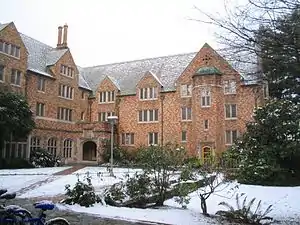
Hansee Hall is a building and student dormitory in Seattle, belonging to the University of Washington. Hansee Hall is the oldest residence hall at the University, and was constructed in the 1930s. It took its name in 1961, being named after Martha Lois Hansee.[9] Hansee was a professor of Greek language and literature who taught at the University from 1881 to 1884 and again from 1895 to 1903. Its internal divisions consist of a narrow corridor attached to four different "Houses", Blaine, Austin, McKee and Leary. In 1936, all of these took their name from prominent Washingtonian women from the late nineteenth century and early twentieth century. During the Second World War, Hansee Hall was used by the U.S. military. The building imitates the red brick style of certain Ivy League schools, and otherwise has a mixture of Tudor and Collegiate Gothic architecture.[10] The building is located off N.E. 45th Street in the north campus, just a short walk from nearby McCarty Hall. It is used as a residence hall to house undergraduates at the University, and mandates 24-hour quiet hours.[11] It was once a women-only dorm, but is now unisex.
Hansee Hall has its own residence hall council called the Kingdom of Hansee. The hall council hosts an annual semi-formal ball open to all residence hall students at the University.[12]
McMahon Hall
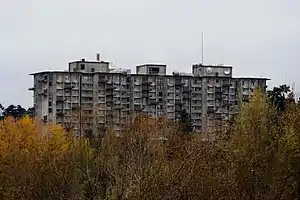
McMahon Hall is an 11-story brutalist-style dormitory, completed in 1965, adjacent to Haggett Hall
McMahon Hall is currently under study. It may be remodeled and continue to be used as a residence hall, it may be converted to academic use or it may be demolished and replaced with another building.[13]
The building consists of a North tower and a South tower. Each tower is then further broken down into 11 floors that each have their own "Clusters". Residents will be assigned to a room within a cluster and these clusters are typically made up of Doubles, with some singles. Each cluster has its own living space, including a common area, shared bathroom and a balcony.
West Campus
West Campus includes the residence halls Alder Hall, Elm Hall, Lander Hall, Maple Hall, Poplar Hall, and Terry Hall. There are also 9-month apartment-style residence halls for undergraduates in Mercer Court and Stevens Court.
Twelve-month apartments
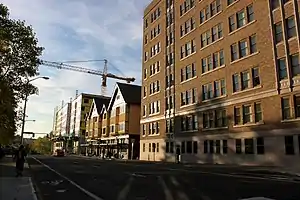
There are a number of university-operated and privately-operated twelve-month apartments available to students. They include Cedar Apartments, Commodore Duchess, Mercer Court D and E (graduate students only), Nordheim Court, and Radford Court.
Family housing
Blakeley Village and Laurel Village provide family housing for registered full-time students at the Seattle campus with dependent children. It is available to single parents and couples who are married or are registered same-sex domestic partners with children. They are located about one mile east of campus, near University Village.
There are also one-bedroom apartments in Stevens Court available to married couples or registered same-sex domestic partners, at least one of whom is enrolled as a full-time student at the Seattle campus.
References
- "Housing FAQ". University of Washington. Retrieved January 2, 2018.
- "Student housing". University of Washington. Retrieved January 2, 2018.
- "Undergraduate Housing". Housing & Food Services. University of Washington. Retrieved August 25, 2019.
- "Housing Master Plan". Housing & Food Services. University of Washington. Retrieved August 25, 2019.
- "Campus Maps". washington.edu. Retrieved July 28, 2012.
- "Archived copy". Archived from the original on July 15, 2007. Retrieved November 6, 2007.CS1 maint: archived copy as title (link)
- "Campus myths | The Daily". Dailyuw.com. Archived from the original on January 21, 2013. Retrieved July 28, 2012.
- "HFS rates could increase by 5 percent | The Daily". Dailyuw.com. February 14, 2007. Archived from the original on July 8, 2012. Retrieved July 28, 2012.
- "All 'Bout The Buildings". The Daily of the University of Washington. October 12, 2000. Archived from the original on January 20, 2013. Retrieved July 28, 2012.
- "Archived copy". Archived from the original on October 30, 2008. Retrieved January 3, 2018.CS1 maint: archived copy as title (link)
- "Archived copy". Archived from the original on October 30, 2008. Retrieved January 3, 2018.CS1 maint: archived copy as title (link)
- Klein, Annie (May 15, 1998). "Hansee Hall Ball Celebrates 25th Anniversary". The Daily of the University of Washington. Archived from the original on January 21, 2013. Retrieved July 28, 2012.
- Long, Katherine (January 18, 2016). "UW to demolish 2 old dorms, build 5 new ones". The Seattle Times. Seattle. Retrieved December 30, 2017.
